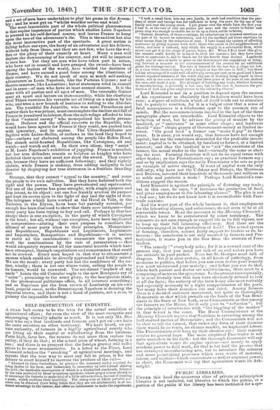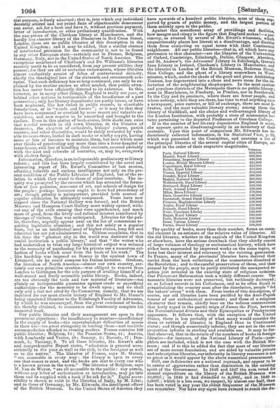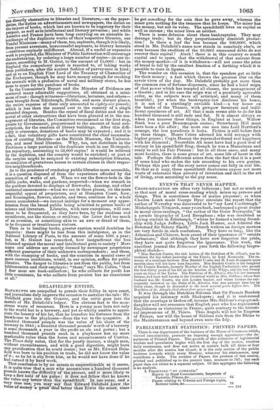PUBLIC LIBRARIES.
UNDER this head the numerous class of private or subscription libraries is not included, but libraries to which the public, or a portion of the public if the library has been instituted for a spe- vial: purpoae, is freely admitted; thatis, into which any individual decently attired" an not prima facie of _objectionable demeanOur can enter, ask .for a•book and have it, without previous payment, letter of introduction, or other preliminary qualification. With the exceptions of the Chetham library at. Manchester, and the hardly less obscure library of the Dissenters in Red Cross Street, London, there are no public libraries of this description in the United Kingdom.; and it may be added, that a similar absence of intellectual provision for the community is not to be found in any other European state—certainly_not in France, Belgium, Germany, Italy,. nor in the United States of North America. The exceptions mentioned of Chetham's and Dr. Williams's libraries scarcely merit to be so considered, from any present utilities :hey possess ; for they are old or sectarian endowments, whose libraries almost exclusively consist of folios of controversial divinity, chiefly the theological lore of the sixteenth and seventeenth cen- turies. That such deficiency has so long continued, can only be ex-. plained by the routine excuse, so often needed, that public atten- tion has never been efficiently directed to its existence. In this, however, as in many other things, England is really not poor, or behind other nations in testimonials of the beneficence of a past generation ; only her literary depositories are partly latent, or have been neglected, like- her riches in public records, in charitable foundations, or in "woods and forests "; or it may be that they have been contemned or overlaid by more recent and valuable ac- quisitions, and now require to be unearthed and brought to the surface. Even in this matter of book-stores, little doubt can exist that careful research in -old town libraries, in the libraries of deaneries, the chapters of cathedrals, bishops' palaces, parish• vestries, and other obscurities, would be richly rewarded by valu- able treasure-trove, buried in dark nooks or murky crypts, having more or less of incomes to maintain them, but into which none ever thinks of penetrating any more than into a fever-hospital or lazar-house, still less of handling their contents, covered probably with the dust and cobwebs of centuries, or, may be, overgrown with cholera fungi. Information, therefore, is an indispensable preliminary to library reform ; and this has been largely contributed by the novel and interesting report of Mr. Ewart's Committee of last session, affording valuable and curious intelligence not only on the pre- sent condition of the Public Libraries of England, but of the re- lation in which they stand to those of other countries. The in- quiry was prompted by the success which has attended the forma- tion of free galleries, museums of art, and schools of design for the people : perhaps literature ought to have had precedency of art; though priority is unimportant, provided both sources of popular edification be ultimately compassed. Years have now elapsed since the National Gallery was formed, and the British Museum and Ilampton Court Gallery more widely opened, with- out any of the evils ensuing that were apprehended, and much more of good, from the lively and rational interest manifested by throngs of visiters, than was anticipated. Libraries for the pub- lic, therefore, urgently appear, next on the list of concessions re- quiring legislative attention ; and this not solely as a popular boon, but as an intellectual need of higher claims, long felt and admitted but not yet administered to. Gibbon complains, that in his time the " greatest city in the world was destitute of that useful institution a public library," and that " the writer who had undertaken to treat any large historical subject was reduced to the necessity of purchasing for his private use a numerous col- lection of books which must form the basis of his work." The like hardship was imposed on Roscoe in the opulent town of Liverpool, ere he could compose his Italian histories. Graham, the historian of North America—almost our own country, cer- tainly our own primitive creation—was obliged to remove from London to Gottingen for the sole purpose of availing himself of a well-stored and freely accessible public library. Books, indeed, are too obviously the tools and raw material of literature—too plainly an indispensable guarantee against crude or superficial authorship—for the necessity to be dwelt upon • and we shall only add a fact not cited by the Committee, namely, that we are indebted for our most classic history of England to Mr. Flume's being appointed librarian to the Edinburgh Faculty of Advocates, by which he was encouraged, from the great command of books, &c. thereby obtained, to commence and luminously complete his immortal work.
Our public libraries and their management are open to five prominent objections : the insufficiency in number—insufficiency in the supply of books—the superabundant difficulties of access in their use—too great stringency in lending them—and too little accommodation afforded to eve_ning readers. France contains 109 public libraries; Belgium, 14; the Prussian States, 44; Austria, with Lombardy and Venice, 48; Saxony, 6 ; Bavaria, 17 ; Den- mark, 5; Tuscany, 9. To all these libraries, Mr. Ewart's able and comprehensive Report states, "admission is granted unre- strictedly to the poor as well as the rich, to the foreigner as well as to the native.' The libraries of France, says M. Guizot, " are accessible in every way : the library is open to every one that comes to read, and the hooks are lent to every one who is a known person in the town." : The libraries of Belgium, says M. Van de, Weyer, " are all accessible to the public r any person, without any letter of authorization or introduction, may go into them and be supplied with a book if he ask for it." Equal acces-
sibility is shown to exist thelibraries of Italy, bY,M. Libri; and in those of Germany, by .Mr. Edwards, the intelligent officer of the British Museum. In the United States of America they
have upwards of.a hundred public libraries, most of them sup. ported by grants of public money, and the largest portion of them entirely open to the public. Against this munificent array of providinga and facilities, how meagre and stingy is the figure that England makes i—a par- simony, as attested by several of Mr. Ewart's witnesses, which unquestionably places her literati at a disadvantage, and disable them from competing on equal terms with their Continental neighbours. All our public libraries—that is, all which have any pretension to that character—are the libraries of the Universities of Oxford, Cambridge, Edinburgh, Dublin, Glasgow, Aberdeen, and St. Andrew's, the Advocates' Library in Edinburgh, Queens Inns Library in Ireland, Chetham's Library in Manchester, and the libraries in London of the British Museum, Redcross Street, Sion College, and the ghost of a library somewhere in West- minster, which, under the shade of the good and pious Archbishop Tenison, has degenerated into a chess and news room for the de- lectation of the neighbouring shopkeepers. In the most opulent and populous districts of the Metropolis there is no public library; none in Marylebone, in Finsbury, in Pimlico, nor in Southwark. In the City and its precincts, where there are fewer people, and where nobody, while they are there, has time to read anything save a newspaper, price current, or bill of exchange, there are most li- braries, and the most valuable literary stores; among them the library of Guildhall, and the choice and well-arranged library of the London Institution, with probably a store of manuscript lec- tures pertaining to the departed Professors of Gresham College. If in the number of her literary depositories England is scant, she appears quite as disadvantageously in an inventory of their contents. Upon this point of comparison Mr. Edwards has in- dustriously collected information, in his Statistical View, p. 22, which was presented to the Committee, and contains a list of the principal libraries of the several capital cities of. Europe, ar- ranged in the order of their respective magnitudes;
Volumes.
Paris, National Library 824,000 I.lnnich, Royal Library 600,000 Petersburg, Imperial Library 446,000 London, British Museum Library 435,000 Copenhagen, Royal Library 412,000 Berlin, Royal Library 410,000 Vienna, Imperial Library 313,000 Dresden, Royal Library 300,000 Madrid, National Library 200,000 Wolfeubuttle, Ducal Library 200,000 Stuttgard, Royal Library 189,000 Paris, Arsenal Library 180,000 Milan, Brera Library 170,000 Paris, Genevieve Library 150,000 Darmstadt, Grand Ducal Library 150,000 Florence, Magliabecchian Library 150,000 Naples, Royal Library 150,000 Brussels, Royal Library 133,000 Rome, Cassonate Library 120,000 Hague, Royal Library 100,000 Paris, Mazarine Library 100,000 Rome, Vatican Library 109,000 Parma Decal Library 100,000
The quality of books, more than their number, forms an essen- tial element in an estimate of the relative value of libraries. All the old libraries, whether in the capitals of the United Kingdom or elsewhere, have the serious drawback that they chiefly consist of large volumes of theology or ecclesiastical history, which have either been superseded by improved works on the same topics,. or have lost their interest and relevancy to the existing generation. In France, many of the provincial libraries have derived their nuclei from the book collections of the monasteries dissolved at the Revolution ; and to the careful preservation of them, and their perusal by the people, may be partly attributed the unexpected re- action just revealed in the existing state of religious opinions. Our Protestant Reformation took a widely different course. The monastic libraries were not preserved, but ruthlessly destroyed; or, as Leland records in his Collectanea, and as he often found in perambulating the country soon after the dissolution, people "fed the bakers' ovens" with them. From books of this description, of course, our old libraries have been purified by the Anti-Popish tenour of our ecclesiastical movement; and those of a religious character that remain, chiefly bear on the tedious controversies that hotly raged in the pacific reign of James the First, between the Nonconformist divines and their Episcopalian or Presbyterian opponents. It follows that, with the exception of the -United States, there is less probably of what many would consider the dross or rubbish of libraries in England than in Continental states; and though numerically inferior, they are not in the same proportion inferior in sterling and available use. It may be fur- ther observed, that in the return of the numbers of books in foreign libraries—for instance, of the National Library of Paris—pam- phlets are included, which is not the case with the British Mu- seum; and if to this be added the fact that most of our libraries are of more recent foundation, and are aided by valuable private and subscription libraries, our inferiority in literary resources is not so great as it would appear by the above numerical presentment. Still, our deficiencies are a national reproach, and appear to be in course of aggravation rather than diminution in the existing spirit of the overnment. In 1846 and 1847 the sum voted for• annual expenditure on the library, of the British Museum. was 10,0001.; in 1848 it had dwindled to 8,500/., and in 1849 to 5,000/. ; which is a less sum, we suspect, by alnaost one half, than has been voted in any year the oldest frequenter of the Museum can remember. Nor have any signs been evinced to remit the du- ties directly obstructive to libraries and literature,—as•the paper- duties, the duties on advertisementh and newspapers, the duties on the import of books, which last are known to be nugatory for their purpose, e as well aim intellectual and literary privation ; and while America and France have been long carrying on an amicable in- terchange of the duplicate works of their respective libraries, our Vandal Ministers--rnany of them, too, aspirants, though it is likely, from present aversions, unsuccessful aspirants, to literary honours --continue supinely indifferent, Abroad, if a useful or expensive work is projected, the Minister of Public Instruction will encourage the undertaking, by ordering a large number of copies—in one in- stance, according to M. Guizot, to-the amount of 15,0001.: but in England the compulsory mode is resorted to, of taking works from publishers, after the ancient fashion of purveyance in kind; and as to an English First Lord of the Treasury or Chancellor of the Exchequer, though he may have money enough for stocking the arsenals with a profusion of naval and military stores, he has none to spare for the purchase of books. In the Committee's Report and the Minutes of Evidence are scattered many admirable suggestions, all obtained at a mini- mum of cost : though witnesses—librarians, lecturers, and others— were brought from Edinburgh, Dublin, and more distant places, the entire expense of them only amounted to eigh,ty-six pounds; which is less than the annual cost to the country of a single mounted dragoon. Besides the repeal of fiscal duties and the re- moval of other obstructions that have been glanced at in the ma- nagement of libraries, the Committee recommend as the first step, grants by Government, proportioned to the amount of local sub- scriptions, for the erection of library buildings. After this diffi- culty is overcome, donations of books may be expected ; and it is a fact, that voluntary gifts have constituted the chief accumula- tion of existing libraries—as the British Museum, the Universi- ties, and most local libraries. Why, too, not distribute in the Provinces a large portion of the duplicate stock in our Metropoli- tan repository, amounting to 52,000 copies? it would be relieved by the depletion, and the country would be enriched ; or part of the surplus might be assigned to existing subscription libraries, on condition of gratuitous access to certain classes in their respec- tive neighbourhoods. As to the prudence of rendering public libraries more accessible, it is a question disposed of from the experience afforded by the exposition of works of art. When we see the flower-beds in the public parks, walks, and gardens, respected—when we remark in the gardens devoted to displays of fireworks, dancing, and other nocturnal amusements—when we see in these places, on the mere respectful appeal of proprietors, and at Hampton Court, Kew, and Kensington, flowers, shrubs, and trees, continue for a whole season unmolested—we cannot indulge for a moment any appre- hension from the broad public being admitted to peruse books of science and literature. Libraries, with rare exceptions, will con- tinue to be frequented, as they have been, by the studious and considerate, not the riotous or reckless; the latter feel too much of an aversion, or something akin to an awe or dread of them, to be frequent or troublesome visiters.
Then as to lending books, greater caution would doubtless be requisite: there might be loss from this indulgence, as in the National Library of Paris, to the amount of some 1001. a year; but, as M. Guizot has remarked, how insignificant the loss balanced against the moral and intellectual gain to society I Mere name and address are mostly deemed by newspaper proprietors sufficient guarantee of their unknown correspondents; and these, with the stamping of books, and the exaction in special cases of more onerous conditions, would, in our opinion, suffice for public libraries. The danger to libraries is .not from the public, but from bibliomanists and their employes: "those," says Mr. Colles, "that I fear most are book-collectors ; he who collects for profit has little conscience, he who collects from passion has no conscience at all."




























 Previous page
Previous page